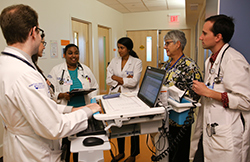While you’re in our care, you’ll have a team of professionals working to meet your clinical, emotional and other needs.
Specialized, coordinated care
You’ll meet a number of health professionals while you’re in our care. You may want to learn a bit about their roles and how they work with you to help you heal.
Medical Team
Physicians and nurses work together to make sure you get the clinical care you need. As a respected teaching hospital, Penn State Health also trains doctors, nurses and other health care workers from across the nation.
Here’s who may help care for you or your loved one, and how to tell who they are:
Attending physicians
 Attending physicians, also called “attendings,” are doctors who guide and supervise residents and medical students. They make the final decisions about your care. You may meet an attending during morning rounds. He or she might talk to you about your condition and treatment. Attendings wear long white coats.
Attending physicians, also called “attendings,” are doctors who guide and supervise residents and medical students. They make the final decisions about your care. You may meet an attending during morning rounds. He or she might talk to you about your condition and treatment. Attendings wear long white coats.
If you’d like to talk to the attending on duty, ask your nurse to page him or her.
Residents
Resident physicians, or residents, have graduated from medical school. They must work for a number of years, usually from three to five, as a resident. Residents report to an attending physician. They may work with you to make decisions about your care. Like attendings, they wear long white coats.
Medical students
Medical students are studying at Penn State College of Medicine to receive their medical degrees and become doctors. They may talk to you, assess your health and talk with your doctors. Students don’t actively participate in patient care. Medical students wear short white coats.
Physician assistants (PA) and nurse practitioners (NP)
Physician assistants are medical professionals with advanced degrees who work under the supervision of a doctor. Nurse practitioners are registered nurses with advanced degrees who work along with the doctors. Both may examine patients, order tests and prescribe medication. They’re identified by their white coats and badges. Physician assistants’ badges will say “PA,” and nurse practitioners’ will say “NP.”
Registered nurses (RN)
Registered nurses work directly with patients to monitor progress and keep doctors informed of any changes. RNs also advocate for patients and families. They’re identified by the “RN” on their badges.
Nursing students
Nursing school students report directly to registered nurses or nursing instructors from Penn State and other nearby nursing schools. They may talk you about your care and help assess your health, but they are always supervised by a nurse or instructor.
Care-Giving Team
Care coordinators, social workers, educators and family care reps work in different ways to support you and your family during your stay.
Care coordinators
 Care coordinators are nurses who help smooth the transition from hospital to home. Your care coordinator will help you prepare for discharge from the hospital. He or she will also work with your family or other caregivers as needed. Your coordinator will make sure you have any medical equipment or services you might need at home. He or she may work with social workers and others.
Care coordinators are nurses who help smooth the transition from hospital to home. Your care coordinator will help you prepare for discharge from the hospital. He or she will also work with your family or other caregivers as needed. Your coordinator will make sure you have any medical equipment or services you might need at home. He or she may work with social workers and others.
To contact your care coordinator, call 717-531-8306.
Social workers
Social workers can support your care in many ways. They help make sure you have the support and resources you need while you’re here and after you go home. They also connect you with resources within Penn State Health or in the community. Social workers can:
- Help you adjust to the hospital setting
- Provide counseling for emotional, financial and social issues
- Help find answers to insurance questions
- Manage discharge services so you have the information and help you need when you go home
To meet with a social worker, please call 717-531-8306.
Patient- and family-centered care representatives and volunteers
Patient- and family-centered care representatives and volunteers help you have the best experience possible while you’re in our care. They can help resolve any issues or concerns you or your loved ones may have about your care. Reps and volunteers can:
- Help you find your way around the hospital
- Find restaurants, products and services nearby
- Connect you with information and resources
- Provide emotional support for you and your loved ones
- Help you communicate with your health care team
You and your family can help us find ways to improve care and support. Talk to a rep or volunteer about serving as a patient or family advisor on an advisory committee.
To contact the patient- and family-centered care staff and volunteers, email PFCC@pennstatehealth.psu.edu.


